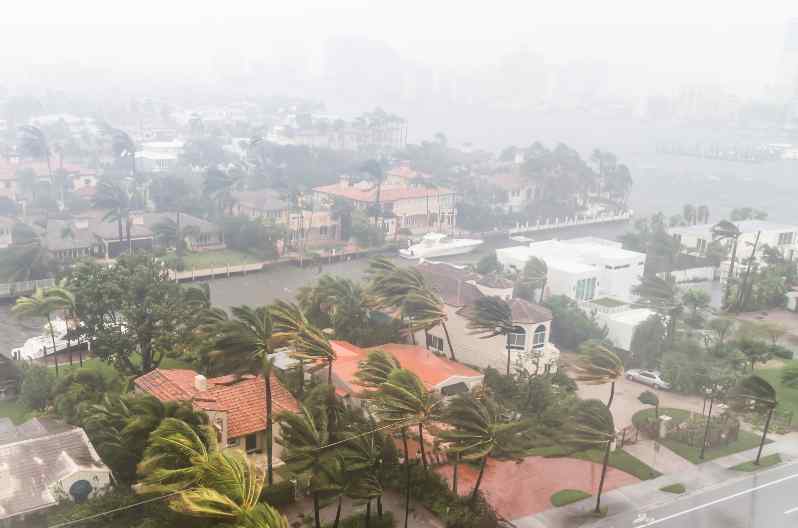Although all floods cause damage, storm surge flooding is more dangerous due to the saltwater involved. Salty water is more corrosive than fresh water, increasing the risk of damage. From corroding metals to breaking down concrete and drywall, coastal flooding causes several types of salt water damage. We look at why saltwater flooding does more damage than fresh water and cover the main effects of salt water exposure. Plus, we explain the basics of cleaning up your home after coastal flooding and saltwater damage.
Why Does Salt Water Do More Damage Than Fresh Water?
Water is already a powerful solvent, but higher levels of salt increase the conductivity of water. This speeds up its ability to corrode metals and break down organic materials. There are several reasons flooding is more dangerous with salt water verse fresh water. Here are the most common effects of salt water flood damages:
Corrodes Metal
Salt water does more damage than fresh because it is more corrosive. The salt can actually eat away at metals, causing rust in just a few days. If the metal was already rusty or weakened, it could cause significant corrosion in less than a week. Long-term exposure to salt water with rust or even dissolve metal items. Copper wiring and electrical systems are at the highest risk for salt damage.
Dissolves Building Materials
Saltwater can also corrode building materials, breaking them down much faster than freshwater. It can dissolve wood, plaster, and drywall in as little as a few days. It can also damage and weaken concrete and cinder blocks in just a few weeks.
Erodes the Soil
Coastal floodwaters can damage the soil around your home, causing your foundation to shift or sink. This can lead to cracks or structural damage that weakens your home.
Takes Longer to Dry
While this may seem odd, salt water takes longer to dry than fresh water. The salt helps walls and other surfaces hold onto water longer. This means longer drying time and more damage.
Still Causes Mold
It’s a common myth that the salt in saltwater prevents mold. The truth is salt water is more likely to cause mold growth than fresh water because it takes longer to dry. For that reason, it’s important to begin cleaning up a saltwater flood as soon as possible to prevent mold.
Has a Higher Risk of Electrocution
Water is a good conductor, but salt increases its conductivity. The salt increases the potential for electrical current in the water, increasing the risk of electrocution. Always take precautions when entering your property after saltwater flooding to prevent shock and electrocution.
Salt Remains Once the Water is Gone
Salt will continue to damage your home even after the water is gone. While the water will evaporate and dry, the salt will form a coating on walls and surfaces. Unless it’s properly cleaned, the salt will continue to corrode metals and building materials long after your home is dry.
Talk to a local pro now. Certified Restoration Local water cleanup specialists offer 24-hour service and fast, free quotes.
How to Restore Your Home After Salt Water Damage and Coastal Flooding
Unless properly cleaned up, the salt damage will continue even after the water dissipates. These are the basic steps to take after a coastal or saltwater flood. If you have questions about cleanup or need help, call us today to speak with a restoration specialist near you.
- Wait for the All Clear to Return to Your Property: If you evacuated during the storm, wait for the all-clear to return home. Even if it’s safe where you are, you don’t know what conditions you come across on your way home.
- Take Precautions Before Entering Your Home: You are probably eager to begin cleanup, it’s important to be safe. Make sure the electricity is off to prevent electrocution. Then check the outside of your home for structural damage.
- Take Photos and Video of the Damage for Your Insurance Claim: Even if you don’t have coastal flooding or hurricane coverage, you should always document the damage. While your insurance may not cover the cost of cleanup, you may still qualify for Federal-aid or other assistance.
- Contact a Restoration Company to Extract the Salt Water: Since salt water is more corrosive than freshwater, you should hire a restoration company for cleanup. They have the training and experience to prevent damage and properly clean up and repair your home.
- Have Your Home Surveyed: Due to the potential for soil erosion, you should have your home surveyed. This way, you know your home is safe and won’t collapse.
- Start Rebuilding Once Your Home is Safe: Finally, it is safe to start rebuilding. Depending on the damage, this could include anything from installing new drywall or completely building the inside of your home.
If you have saltwater damage from coastal flooding, our restoration specialists are available to clean up and repair the damage quickly. Call Restoration Local now at 888-443-3110 for a free in-home estimate and immediate water damage cleanup services.





